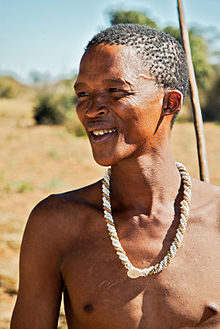
Back Khoisan Afrikaans كويسان Arabic Кайсанскія народы Byelorussian Кайсанскія народы BE-X-OLD Койсан Bulgarian Khoisan Catalan Khoisanové Czech Khoisan Danish Khoisan German Kojsanoj Esperanto
 | |
| Total population | |
|---|---|
| ~ 400,000[1] (c. 2010) | |
| Regions with significant populations | |
| Namibia, Botswana, South Africa | |
| Languages | |
| Xhosa,[2] Khoe-Kwadi languages, Kx'a languages, Tuu languages | |
| Religion | |
| Mainly Christian and African Traditional Religion (San religion) | |
| Related ethnic groups | |
| Tswana, Xhosa, Coloured, Griqua, Hadzabe |
Khoisan /ˈkɔɪsɑːn/ KOY-sahn, or Khoe-Sān (pronounced [kxʰoesaːn]), is a catch-all term for the indigenous peoples of Southern Africa who traditionally speak non-Bantu languages, combining the Khoekhoen (formerly "Hottentots") and the Sān peoples (also called "Bushmen"). Khoisan populations traditionally speak click languages and are considered to be the historical communities throughout Southern Africa, remaining predominant until European colonisation in areas climatically unfavorable to Bantu (sorghum-based) agriculture, such as the Cape region, through to Namibia, where Khoekhoe populations of Nama and Damara people are prevalent groups, and Botswana. Considerable mingling with Bantu-speaking groups is evidenced by prevalence of click phonemes in many especially Xhosa Southern African Bantu languages.
Many Khoesān peoples are the descendants of a very early dispersal of anatomically modern humans to Southern Africa before 150,000 years ago. (However, see below for recent work supporting a multi-regional hypothesis that suggests the Khoisan may be a source population for anatomically modern humans.)[3] Their languages show a vague typological similarity, largely confined to the prevalence of click consonants. They are not verifiably derived from a common proto-language, but are today split into at least three separate and unrelated language families (Khoe-Kwadi, Tuu and Kxʼa). It has been suggested that the Khoekhoeǁaen (Khoekhoe peoples) may represent Late Stone Age arrivals to Southern Africa, possibly displaced by Bantu expansion reaching the area roughly between 1,500 and 2,000 years ago.[4]
Sān are popularly thought of as foragers in the Kalahari Desert and regions of Botswana, Namibia, Angola, Zambia, Zimbabwe, Lesotho and Northern South Africa. The word sān is from the Khoekhoe language and refers to foragers ("those who pick things up from the ground") who do not own livestock. As such, it was used in reference to all hunter-gatherer populations who came into contact with Khoekhoe-speaking communities, and was largely referring to the lifestyle, distinct from a pastoralist or agriculturalist one, and not to any particular ethnicity. While there are attendant cosmologies and languages associated with this way of life, the term is an economic designator rather than a cultural or ethnic one.
- ^ Their total numbers are estimated at roughly 300,000 Khoikhoi and 90,000 San: 200k Nama people (2010): Brenzinger, Matthias (2011) "The twelve modern Khoisan languages." In Witzlack-Makarevich & Ernszt (eds.), Khoisan languages and linguistics: proceedings of the 3rd International Symposium, Riezlern / Kleinwalsertal (Research in Khoisan Studies 29). 100k Damara people (1996): James Stuart Olson, « Damara » in The Peoples of Africa: An Ethnohistorical Dictionary, Greenwood Publishing Group, 1996, p. 137. 50-60k San people in Botswana (2010): Anaya, James (2 June 2010). Addendum – The situation of indigenous peoples in Botswana (PDF) (Report). United Nations Human Rights Council. A/HRC/15/37/Add.2..
- ^ Parkinson, Christian (2016-06-14). "The first South Africans fight for their rights". BBC News.
Most [Khoisan people] now speak Afrikaans as their first language.
- ^ Ragsdale, Aaron P.; Weaver, Timothy D.; Atkinson, Elizabeth G.; Hoal, Eileen G.; Möller, Marlo; Henn, Brenna M.; Gravel, Simon (2023). "A weakly structured stem for human origins in Africa". Nature. 617 (7962): 755–763. Bibcode:2023Natur.617..755R. doi:10.1038/s41586-023-06055-y. PMC 10208968. PMID 37198480.
- ^ Barnard, Alan (1992). Hunters and Herders of Southern Africa: A comparative ethnography of the Khoisan peoples. New York, NY; Cambridge, UK: Cambridge University Press.
© MMXXIII Rich X Search. We shall prevail. All rights reserved. Rich X Search